| Published: | 2010-11-13 |
| Manufacturer: | K&S Rockets  |
(05/27/08) Always enjoy checking out new rocket kit manufacturers and was pleased to get a Vapor Trail 24mm from K&S Rockets. The rocket has some really unique-looking fins and a slant-cut aft end. It also consists of a payload section.
The kit comes with a kraft-type paper main body tube with a slant cut already made. The upper payload section of the same tube. There is a black plastic ogive nose cone. The rocket comes with laser-cut 1/8" thick balsa fins, a bulkhead (eye-bolt, plywood disk and coupler), an 18" Hartle Engineering parachute, swivels, 48" of ¼" elastic shock cord, a Kevlar® shockcord mount, clay nose weight and two launch lugs.
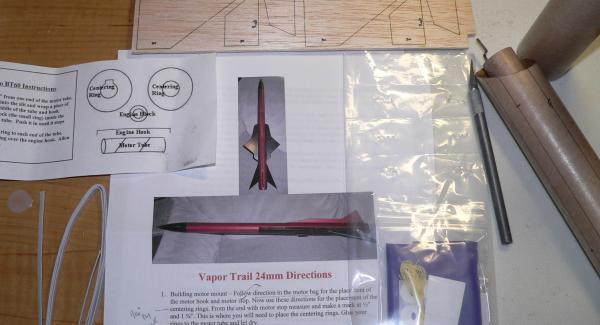
CONSTRUCTION:
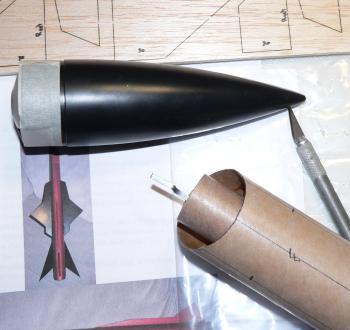 Construction is not difficult, but the builder should have a
number of level 2 and 3 builds under his/her belt before attempting this rocket build. The reason is that the
instructions are primarily text. There are two pictures of the finished rocket that are referenced for guidance.
Construction is not difficult, but the builder should have a
number of level 2 and 3 builds under his/her belt before attempting this rocket build. The reason is that the
instructions are primarily text. There are two pictures of the finished rocket that are referenced for guidance.
Now, with that being said, K&S ensured that all the lines were pre-drawn on the body tube and that the fin pieces were marked so that there would be no mistakes in assembly.
Construction starts with the motor mount, which came in its own bag. It is a straightforward 24mm to BT60 motor mount including a motor hook for retention.
The fins need to be glued together by placing them on a flat surface and aligning
the proper sides (pre-marked). Once these are dried they are placed right onto the body tube positions which as
mentioned are also pre-marked.

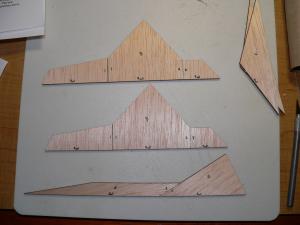
K&S recommends wood glue for the build, with the exception of the bulkhead where they recommend epoxy. I didn't follow those instructions because I wanted to test out the new Gorilla Glue Super Glue. I did make my fin fillets with wood glue.
The parachute requires assembly. It is from Hartle Engineering. It is a plastic parachute that using hole reinforcement stickers and kelvar thread as shroud lines. (Here is a review on the Hartle's parachutes)
The 48" of elastic shock cord is tied to two provide swivels (nice touch). The Kevlar® shockcord mount is glued into the body tube using the 3-fold paper method.
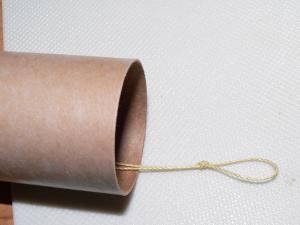

All-in-all, an easy build.
 I didn't put a lot into finishing the rocket. I used
3 coats of Plasti-Kote Primer without
sanding in between. I put it on thick. Then I sanded the primer down to hide the balsa grains and the spirals. I hit it
again with a single coat of primer. I then painted the who rocket with Ace Hardware brand Royal Blue paint. I was
planning on doing detail work after a few flights (note the work planning).
I didn't put a lot into finishing the rocket. I used
3 coats of Plasti-Kote Primer without
sanding in between. I put it on thick. Then I sanded the primer down to hide the balsa grains and the spirals. I hit it
again with a single coat of primer. I then painted the who rocket with Ace Hardware brand Royal Blue paint. I was
planning on doing detail work after a few flights (note the work planning).
Overall, for CONSTRUCTION I would rate this kit 3 ½ points. Instructions are primarily text, but are very clear and easy to follow. The pre-marked lines make it a bit easier. Quality parts and fit. There were no decals.
FLIGHT/RECOVERY:
K&S Rockets website indicates that the Vapor Trail "reaches altitude of 800ft on D12-5".
Well, I didn't have a D12-5, but I did have a couple of D12-7's. I decided I'd go for it.
The rocket requires quite a bit of wadding due to its own wider body tube. I put in 7-8 squares crumpled to various degrees.
There was virtually no wind for the first flight. The rocket climbed relatively straight up with an elongated oscillation. It was stable but I think all that fin area prevented a perfectly straight boost. The rocket did not spin at all.
The 7 second delay meant the rocket had started downward prior to ejection. The D12-5 would have been just right.
The Hartle parachute opened and the rocket fell at a nice pace and landed just inside the launch field. The parachute had a couple of small burn holes in it from the ejection charge. Everything else looked okay.
The second flight was a repeat of the first with a D12-7. This time I put a single square of wadding and put it into the motor tube before loading the D12-7. Recovery was good and there was no sign of any new burn marks.
For the third flight, I used a 24mm-18mm adapter and installed a C6-3. Not a good decision. The rocket came off the pad too slow and did a large under-powered half-arc to about 100 feet. Unfortunately for me, my rocket decided to arc toward trees. It ejected and landed at the very top.
For FLIGHT/RECOVERY, I would rate this rocket 4 points. D12 flights were excellent. A C11 would also be do'able. The motor mount is not designed to accept E9 motors. The parachute is sized correctly. Big wings/fins draw attention to its looks, but also may not be the best for a perfectly straight flight.
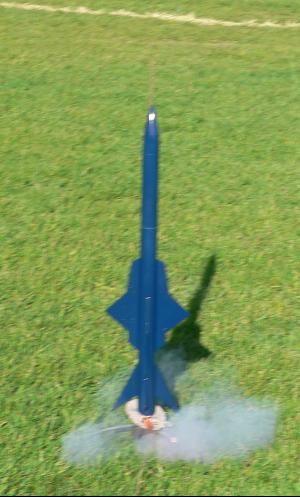
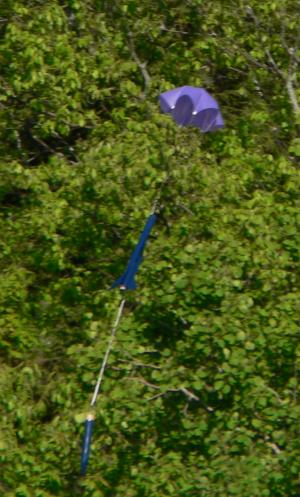
I give the rocket an OVERALL rating of 4 points. My first impressions of this rocket are positive for a builder with some experience. I'm not sure how K&S Rockets will be successful pre-marking all the tubes if they start to get a lot of orders... but for now, it saved me time and helped ease the build process.
Too bad I lost it, because I would have liked to attempt some 24mm RMS motors in it.
 |
 |
Flights
Sponsored Ads
 |
 |











